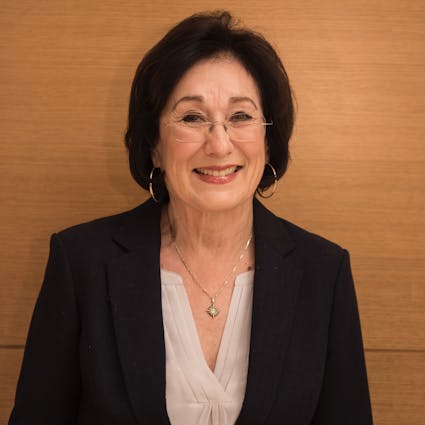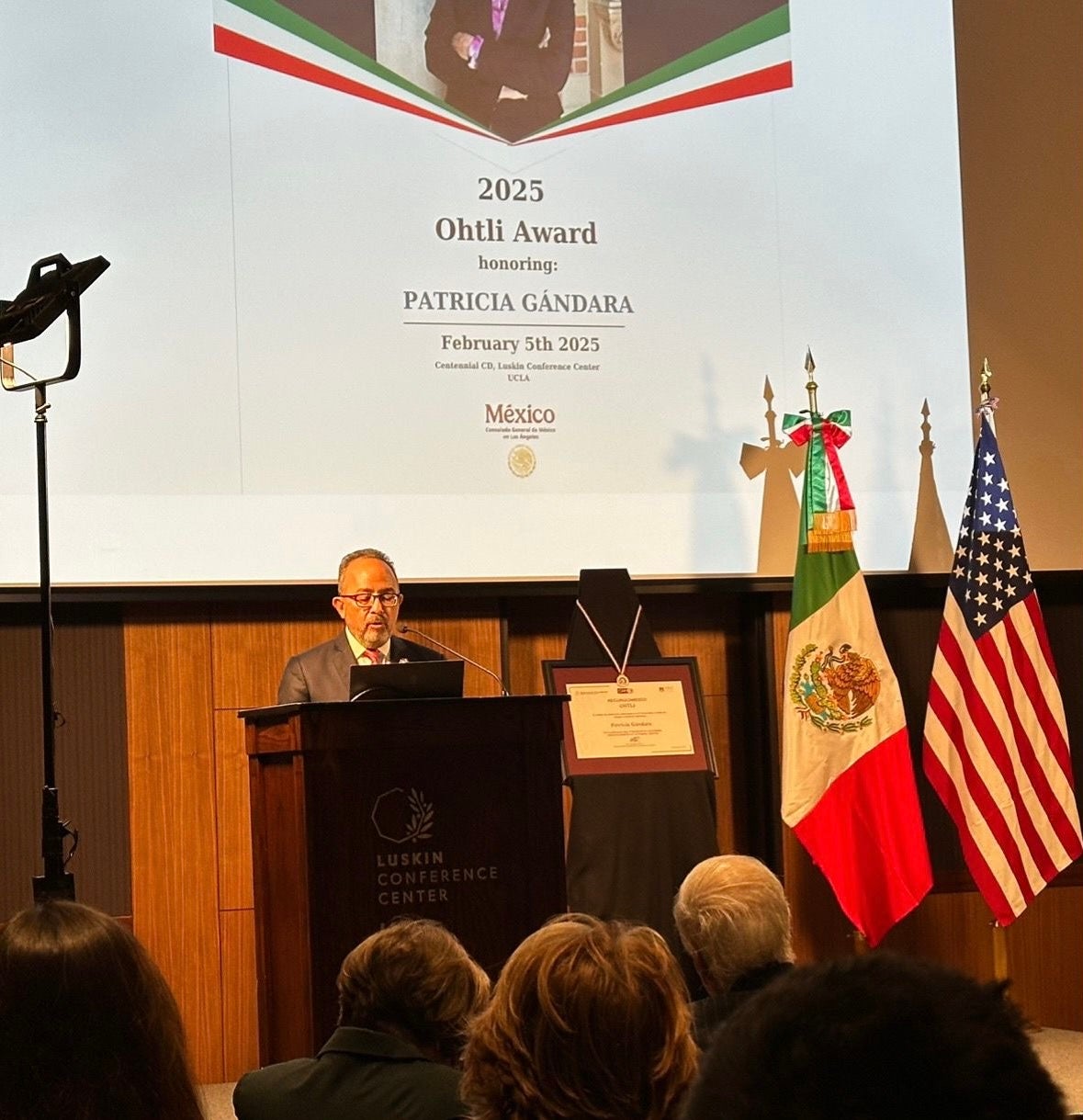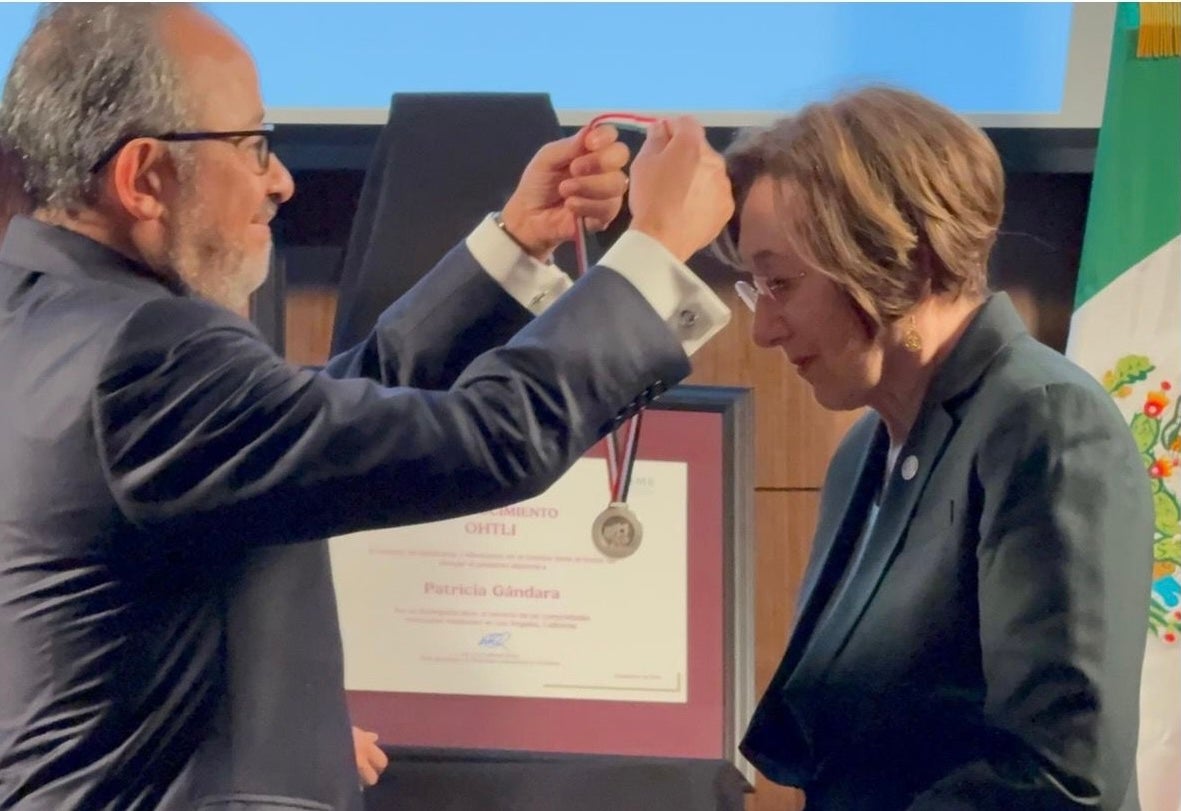Prestigious award recognizes those who have set a path for others, benefitting Mexican citizens and culture. Gándara’s contributions have furthered bilingual education, protected the civil rights of Latinos and others, and illuminated the needs and potential of transnational students and educators.
The Ohtli Award, or Reconocimiento Ohtli, is one of the highest honors given by the Government of Mexico to citizens living outside of Mexico. The award is bestowed annually by the Mexican Secretariat of Foreign Affairs in recognition of those whose efforts have benefitted the people of Mexico and promoted Mexican culture. In Nahuatl, “Ohtli” means “camino,” a path or road, and is given to those who have set a path or shown an example for others.
The latest recipient of the Ohtli Award is UCLA’s Patricia Gándara, who was honored with the award in a ceremony on Feb. 5 at UCLA, hosted by the Mexican Consulate in Los Angeles.
“I had the honor of bestowing the Ohtli Award upon Dr. Patricia Gándara, a UCLA professor and expert on transnational students,” said Carlos Gonzalez Gutierrez, Consul General of Mexico, Los Angeles in comments later posted on social media. “Her academic work has transformed countless lives, expanding opportunities and opening paths for young immigrants across borders.”
The Ohtli Award is a silver medal depicting an Aztec god, cutting grass with a machete to forge a path for others.

“I cannot think of a more fitting image of what Patricia has done for countless scholars both here and in Mexico, including myself,” said UCLA School of Education and Information Studies professor Lucrecia Santibañez in comments at the ceremony. “She has forged a path with an academic machete, leading the way with the force of her intellect, her personality and her passion.
“I would not be here today, speaking to you as a UCLA professor if I hadn’t met Patricia and if she hadn’t championed me from early on. I know many people, some of them right here in this room or this university, who can say the same.”
Gándara is a research professor of education and the co-director of the Civil Rights Project/ Proyecto Derechos Civiles at UCLA. An elected fellow of the American Educational Research Association (AERA), the National Academy of Education, and the American Academy of Arts and Sciences, Gándara has a deep level of expertise in bilingual education and has published significant research and comment demonstrating its benefits for students and pushing back against restrictive language policies.

At the Civil Rights Project, Gándara has helped to inform the debate around civil rights protections in the United States, including policies and protections for immigrants, bilingual children and Latinos more generally. Her work has also illuminated the harmful impact of harsh immigration enforcement actions on Latino students.
Gándara served as chair of the UC Working Group on Education for the University of California-Mexico Initiative, conducting groundbreaking research on transnational students and educators across our borders and pursuing the development of policies and programs to address their needs and fulfill their possibility and promise. In 2016, she led the development of The Students We Share| Los Estudiantes Que Compartimos, a bi-national research symposium in Mexico City bringing educational researchers from both countries together to examine student experiences and seek solutions that improve learning opportunities on both sides of the border. Her 2019 paper, The Students We Share: Falling through the Cracks on Both Sides of the US-Mexico border, underscores the significant and increasing challenges faced by children of Mexican immigrants on both sides of the border, and making clear the enormous bilingual, multi-cultural asset students we share represents is at risk of being squandered.
Gándara’s book, “The Students We Share: Preparing US and Mexican Educators for Our Transnational Future,” with Bryan Jensen, a professor at the BYU McKay School of Education, examines the policies, norms, and classroom practices of the US and Mexican education systems, to prepare educators to understand and help transnational children and youth.

“Patricia sees the two sides of the border as coexisting under the same sky, breathing the same air, living in shared space, even though a deep political border separates us,” says Santibañez. “Where others see differences, she sees unity and strength. As a proud Mexican-American, where others see weakness or limitations, she sees power and possibility in our shared ties. She understands that our connections can never be severed and that our communities will be stronger if they work together and learn from each other.
